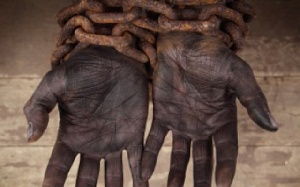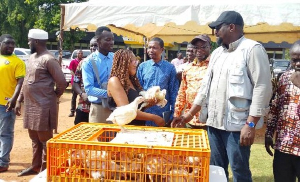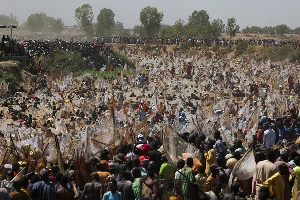The Minister of the Interior, Prosper Bani, has expressed concerns over the increasing rate of human trafficking in the country.
The Minister said he has put in place an inter-ministerial committee to deal with the problem, which has dented the image of the country internationally.
Addressing police officers as part of his two-day tour of the Ashanti Region on Wednesday July 27, Mr. Bani tasked the anti-human trafficking unit of the Ghana Police Service to be proactive in curbing the menace.
“We have observed that there has been an increasing trend in the trafficking of human beings across our borders and within our country. This is not giving us a very good image. Our brothers and sisters, or aunties and nephews are being trafficked abroad to undertake activities that do not befit them as Ghanaians, proud as we are. I will like to task the Ghana Police Service, the Anti-human trafficking unit to begin to live up to expectation by not only arresting culprits, but by ensuring that this network of human trafficking groups are destroyed for the benefit of our young brothers and sisters”, he stated.
“This is an effort that will be collaborated with other agencies and ministries. In the last couple of weeks, I have put together an Inter-Ministerial committee to focus on this exercise. It includes the Ministry of Foreign Affairs, the Attorney General’s Department, the Ministry of Labour and Employment, Ministry of Gender and Children and Social Protection and to be more effective, the government has appointed a liaison coordinator to support this process to reduce the human trafficking activities in this country,” Mr. Bani added.
He also expressed confidence in the ability of the security agencies to ensure peaceful polls in December.
“I can certainly say that the Ghana Police Service is prepared right now to police and effectively maintain law and order when the elections of December 7 take place. I have no doubt that the serenity and the peace that this country is enjoying now would be enjoyed before, during and after the elections because the security services of this country will continue to do its work as it has done. Having an election should not disturb the peace of this country”, the Minister noted.
Just recently, the U.S. Government warned that Ghana risks losing the $498 million Millennium Challenge Corporation (MCC) Compact by next year if the oil-producing, gold-mining and cocoa-growing country fails to adequately fight all forms of modern slavery, trafficking in persons, child labour and sex trafficking, the United States government has warned.
The $498 million aims to help Ghana transform its electricity sector. However, the 2016 Trafficking in Persons Report released by U.S. Secretary of State John Kerry at the U.S. Department of State in Washington, D.C., puts the almost $500 million deal in peril since Ghana, for the second year in a row, has been classified as a Tier 2 Watch List country.
This, according to the U.S. government means that the government of the West African country “does not fully meet the minimum standards for the elimination of trafficking in persons and failed to provide evidence of increasing efforts to combat severe forms of trafficking in the past year”.
Any country ranked on the Tier 2 Watch List for two consecutive years must be downgraded to Tier 3 in the third year unless it shows sufficient progress to warrant a Tier 2 or Tier 1 ranking. A Tier 3 ranking indicates a government does not fully comply with the minimum standards for the elimination of trafficking in persons and is not making significant efforts to do so.
Ghana could be subject to an automatic downgrade to Tier 3 in the 2017 TIP Report.
If Ghana is downgraded to Tier 3 in 2017, it will become subject to restrictions on U.S. assistance, including development aid and the Millennium Challenge Corporation (MCC) Compact. The United States currently provides more than $140 million per year in development aid to Ghana. Other U.S. programmes, including assistance in the areas of law enforcement; capacity building for state prosecutors; security and military assistance; and increasing the capacity of the Electoral Commission, would all be subject to restrictions.
The 2016 TIP Report includes narratives for 188 countries and territories, including the United States. The goal of the report is to stimulate action and create partnerships around the world in the fight against modern slavery.
Commenting on the report, U.S. Ambassador to Ghana Robert Jackson said: “The Trafficking in Persons report recognises the trafficking problems we all know exist in Ghana—forced labour, child labour and sex trafficking of children and adults. It is important to note, however, that it is not the quantity of trafficking in any given country that is being evaluated. Trafficking exists everywhere, including in the United States. Rather, the ranking assesses the efforts made by government to prevent trafficking, prosecute criminals and protect victims”.
“Unfortunately, despite some investigations and awareness campaigns, the government of Ghana did not demonstrably commit to anti-trafficking efforts in 2015. As such, Ghana is placed on the Tier 2 Watch List for the second consecutive year. Ghana must increase the resources it invests in anti-trafficking enforcement and protection activities and track and report the results of its efforts. This includes investigating trafficking cases; prosecuting and convicting traffickers; and providing assistance, protection and care for adult and child victims of trafficking.”
The TIP Report recognises that the Ghanaian government investigated and prosecuted some trafficking and trafficking-related crimes, including allegedly fraudulent labor recruiters and suspected child traffickers; conducted public awareness activities aimed at informing the public about the risks of human trafficking; and provided funding to support two meetings of the Human Trafficking Management Board.
However, key factors in Ghana’s Tier 2 Watch List ranking include no demonstrable increase in prosecution efforts or assistance to victims; zero trafficking convictions in 2015; a decrease in the number of victims identified in the past year; inadequate funding and training for law enforcement and prosecutors; inadequate funding for victim protection and support services; insufficiently stringent penalties for trafficking; and reports of increased of corruption and bribery in the judicial system, which hindered anti-trafficking measures.
The report provides specific recommendations to further the government of Ghana’s anti-trafficking efforts over the next year. These recommendations include:
1. Increase funding and support for police and immigration service efforts to investigate, and police and attorney general prosecutors to prosecute trafficking offenses—especially internal labor and sex trafficking of children—and convict and punish trafficking offenders.
2. Develop and implement systematic methods of collecting and reporting data on investigations, prosecutions, victims identified, and assistance provided.
3. Develop and implement systematic procedures for law enforcement, social welfare personnel, and labor inspectors to proactively identify trafficking victims among vulnerable populations—such as women in prostitution, migrant workers, and children working in agriculture, mining, fishing, and pottering—and refer them to protective services.
4. Provide government funding for the Human Trafficking Fund.
5. Finalise and implement the National Plan of Action against Trafficking.
6. Provide training to prosecutors and judges on the appropriate implementation of the Anti-Trafficking Act.
7. Increase efforts to ensure Attorney General's Department prosecutors review human trafficking case dockets and lead the prosecution of human trafficking cases.
8. Provide support for government-operated shelters for children and adults and training of staff in victim care.
9. Increase efforts to regulate the activity of licensed and unlicensed recruitment agencies and investigate and prosecute agencies suspected of participating in human trafficking of Ghanaian migrant workers.
10. Amend the anti-trafficking act legislative instrument so that it provides sufficiently stringent penalties for all trafficking offenders.
The U.S. government is funding several programmes in Ghana to address trafficking and child labour. In June 2015, President John Mahama and then-Ambassador Gene Cretz signed the Child Protection Compact (CPC) Partnership. The CPC Partnership is a jointly developed, multi-year plan aimed at bolstering current efforts of the government of Ghana and Ghanaian civil society to address child-sex trafficking and forced child labour within Ghana. The Partnership awarded $5 million in U.S. foreign assistance to the International Organisation for Migration (IOM) and NGO Free the Slaves to combat forced child labor and child sex trafficking in the Volta, Central, and Greater Accra regions over the next four years.
In addition, the U.S. Department of Labor’s Mobilising Community Action and Promoting Opportunities for Youth in Ghana’s Cocoa-Growing Communities (MOCA) project is providing $4.5 million to empower 40 cocoa-growing communities in the Ashanti and Western Regions to design and implement Community Action Plans (CAPs) to address child labor at the community level. Additional USDOL projects include $1.5 million to assess the prevalence of child labour in the cocoa sectors of Côte d’Ivoire and Ghana; $3 million to assess the effectiveness of interventions in these sectors; and $5 million to develop and implement strategies to reduce child labor and improve working conditions in artisanal and small-scale gold mining.
USAID Ghana’s Sustainable Fisheries Management Project, a $24 million project aimed at rebuilding marine fisheries stocks and catches through adoption of responsible fishing practices, also includes deliberate steps towards reducing child labor and trafficking in the Central Region of Ghana.
“No one wants Ghana to slip to Tier 3 next year,” said Ambassador Jackson. “Not only is such a move catastrophic for the victims of trafficking, but it would also be disastrous to our development efforts in all areas: agriculture, education, security, governance, health and economic growth. The government of Ghana must increase its anti-trafficking efforts, for the immediate benefit of Ghanaian trafficking victims and the long-term benefit of all Ghanaians.”
More about the Trafficking in Persons Report: The annual Trafficking in Persons Report fulfills a U.S. legal requirement under Section 110(b) of the Trafficking Victims Protection Act of 2000 (TVPA) that the U.S. Department of State submit an annual report to Congress placing governments on one of four tiers based on their efforts to meet the minimum standards for the elimination of trafficking in persons. The Report also contains narratives that describe the scope of human trafficking in each country, anti-trafficking efforts of each government, and discussions of important issues related to human trafficking. The goal of this report is to stimulate action and create partnerships around the world in the fight against modern slavery.
This year's Report is the 16th installment of the report mandated by the TVPA; the Report includes narratives for 188 countries and territories, including the United States.
General News of Wednesday, 27 July 2016
Source: classfmonline.com













